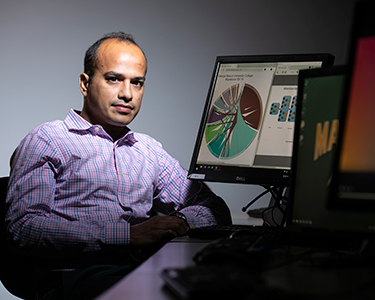
Test the programs and software you’ll be using ahead of time so you don’t miss an online class, says Kamaljeet Sanghera, associate professor in the Department of Information Sciences and Technology.
Cracking the code to successful online learning could mean developing new skills, as well as applying self-discipline, and Mason Engineering professors encourage students to gear up now to excel in virtual instruction.
From March 23 until the end of the semester, the university will offer alternative virtual instruction instead of on-campus classes because of concerns about the coronavirus outbreak.
Online classes will be taught by the same professors with the same content as in-person classes, says Daniel Garrison, director of Mason Engineering Online for the Volgenau School of Engineering.
Some classes may involve synchronous delivery, in which there are specific meeting times for virtual real-time classrooms, or asynchronous delivery, in which there is no specific meeting time and flexible learning with deadlines the instructor provides, he says.
Students should stay up to date on what’s happening, Garrison says. They need to complete readings and assignments and seek help when needed. They should now view their instructors as facilitators of content rather than drivers of content, as is common in the classroom.
“We have comprehensive plans in place to ensure students continue to have the best quality of education,” says Kamaljeet Sanghera, associate professor in the Department of Information Sciences and Technology. She and Garrison are the engineering school representatives for Mason’s Instructional Continuity Working Group, convened by the Provost’s office.
While the educational platform has changed, services from departments such as the Office of Accessibility and Advising will continue to be available, she says. Students are urged to be proactive and not wait to seek assistance.
They should plan to spend the same amount of time on their virtual classes as they would if they had in-person lectures, says Laura Kosoglu, associate chair of the Sid and Reva Dewberry Department of Civil, Environmental, and Infrastructure Engineering (CEIE). “They should hold themselves more accountable and budget their time accordingly,” she says.
Use the time you would have spent commuting to re-watch a lecture or review the notes the professor has posted online, she says.
.jpg)
Don't try to multitask during an online class, says Dave Lattanzi, an associate professor of civil engineering. “In my experience, students who try to do that struggle with online learning.”
“One of biggest challenges is that we are all used to multitasking when we use computers and internet-connected devices,“ says Dave Lattanzi, a CEIE associate professor, who already teaches parts of his classes online. “Most of us think we’re really good at multitasking while learning, but studies have shown that none of us are. When you are in a classroom, your focus is mostly on the instructor and the material in front of you, and you learn differently because of that.”
When you are by yourself, it’s easy to think you can listen to a lecture while you do something else and you can get distracted, he says. “In my experience, students who try to do that struggle with online learning.”
Do whatever you have to do to be present and mindful during the online class, Lattanzi says. "Sitting up in a chair is good. Watching videos while laying down in bed is not."
When he asks students what they like most about his online lectures, they say that it’s the ability to watch the lectures several times or pause them to repeat a section, he says.

Practice the skills are you learning, says Huzefa Rangwala, chair of the Department of Computer Science. Take advantage of all the activities—readings, problems, pre-recorded lectures, and quizzes, he says.
Throughout this semester, keep practicing the skills you are learning, says Huzefa Rangwala, chair of the Department of Computer Science. “Faculty members will often offer activities—readings, problems, pre-recorded lectures, quizzes. Do them at least once to make sure you know the material.”
And if you have questions, reach out via email, discussion forums, or chat tools to the instructor, teaching assistant, or your peers, when appropriate, he says.
Keep in mind that distance learning requires discipline and maturity from students, adds Lance Sherry, an associate professor in the Department of Systems Engineering and Operations Research. “You have to allocate the time to perform online class activities, whether it’s watching a video, doing an assignment, or participating in a group chat.”
Other ideas to increase student success with virtual classes:
- Test the programs and software you’ll be using ahead of time so you don’t miss an online class, Sanghera says.
- Stay focused. When you are online listening to your professor, don’t open other programs—it can be distracting, she says. Find a quiet place where you can focus, and use headphones to block out other noises.
- Make the most of virtual study groups, she says. You can work together online with other students to learn the material and prepare for exams.
- Contact your academic adviser if you need assistance, she says. They are going to be available to you.
- Take advantage of online resources that the university offers, including the online writing center and the online library services, Sanghera says.

Use the time that you would have spent commuting to re-watch a lecture or review the notes the professor has posted online, says Laura Kosoglu, associate chair of the Sid and Reva Dewberry Department of Civil, Environmental, and Infrastructure Engineering.
- Manage stress. Try not to dwell on how this change could affect your grades and learning. Use your time constructively to review the material or check in with your professor, Kosoglu says.
- Keep up with the homework. Don’t wait until the last minute. That is cramming, not learning, Sherry says.
- Take stock of what you don’t know and fill the knowledge gap by actively seeking information, he says.
- Become an engaged and active learner. See if you can apply your knowledge beyond the class practice problems. Post a video or blog on social media about something you have just learned. Be the next Khan Academy on the subject, Sherry says. Or apply your knowledge to a problem/issue in the news. Did it change your understanding? Take it the next step, see if you can develop a product/service using your knowledge to solve a real-world need.
- Remember that posted office hours will most likely also be available virtually, says Garrison. So no matter where you are, reach out to the instructor to take advantage of talking with them, especially if you find yourself falling behind.
- Stay up-to-date on the university by visiting the Stearns Center website, the Mason website, the coronavirus page and the Blackboard page.
Adapting to an online environment will be a learning experience for everyone, says Michael Buschmann, chair of the Department of Bioengineering. Students should challenge themselves to keep a high level of engagement with the professor and the material and look beyond the virtual instruction for additional virtual discussion with the professor and teaching assistant, he says.
Rangwala asks students to remember that they are not alone—many faculty members are also new to this, so give them a break if things don’t run smoothly all the time.
